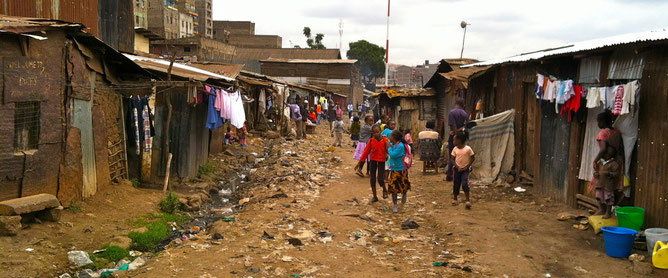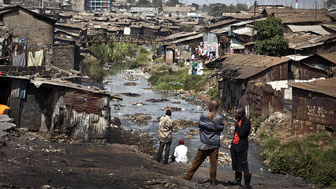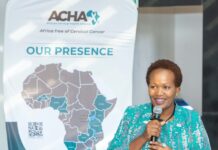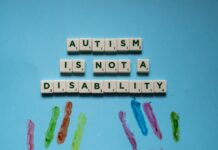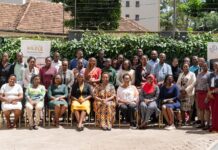By Mary Mwendwa
Mary Mwendwa looks into the frustrations faced by victims of Sexual and Gender-Based Violence (SGBV) when police mishandle forensic evidence required to nab their attackers.
Tears stream down her face as she recalls in gory detail the pain and horror of that night. The night that shattered the lives of two beautiful and hardworking sisters.
Purity and her sister were returning home from a long and tedious day in the City of Nairobi’s Central Business District (CBD), where they hawk merchandise for a living. The two wake up every day before sunrise and travel to the CBD to sell different wares.
Theirs is a life of turmoil and tribulation.
They have mastered the art of playing cat and mouse with County Government askaris. Many are the times they have been arrested and their goods destroyed or confiscated. Many are the times they had to part with their hard-earned money to secure their freedom from the county security officers.
However, no hardship or challenge could have prepared them for that dreadful night. They were walking home in the sprawling informal settlement of Mathare when a white Probox Toyota suddenly screeched to a halt near them.
Two men jumped out of the vehicle brandishing guns and forced them into the car. They were driven to Nairobi’s Langata area and bundled into a deserted house. For hours the two sisters were raped, beaten, and humiliated. Fatigued and near death, they were dumped in a roadside ditch and left for dead.
A good and kind-hearted citizen rescued them by giving them bus fare that saw them reach Medecins Sans Frontiers (Doctors without Borders) MSF Kenya in Mathare which has become a rescue center for hundreds of Sexual and Gender Based Violence (SGBV) victims. The two had joined a list of women and girls who had been raped, assaulted and sexually molested since Kenya was engulfed in horrific post-election violence following the 2007 general election.
The MSF clinic is one of the largest SGBV projects in Kenya. Hundreds of women wade through the dusty, sometimes muddy, and dingy narrow paths of Mathare to the clinic every year for treatment and SGBV post-care.
Survivors of sexual violence stream in from different parts of the city. You will find them seated in silence, some with bandaged faces waiting to be attended to.
Many of the Sexual Gender Based Survivors are still not able to get justice despite the advancement in forensic science that is able to accurately link their attackers to the crime.
It is here that Purity and her sister were treated after their night of terror. .”We work as hawkers in the city of Nairobi and that makes us work till late in the night. On this particular night, we had just finished our business and we were walking back home when suddenly a car, Probox type slowed down next to us. Two men came out brandishing guns and sandwiched us in the car. They threatened to kill us if we screamed or raised an alarm. They drove us out of the city and we finally landed in a house in Langata estate in the west of Nairobi. We were raped the whole night. In the morning they threw us out of the house with nothing. A Good Samaritan helped us with bus fare and we boarded a vehicle straight to MSF clinic in Mathare. Here we were welcomed well counseled and treated.”
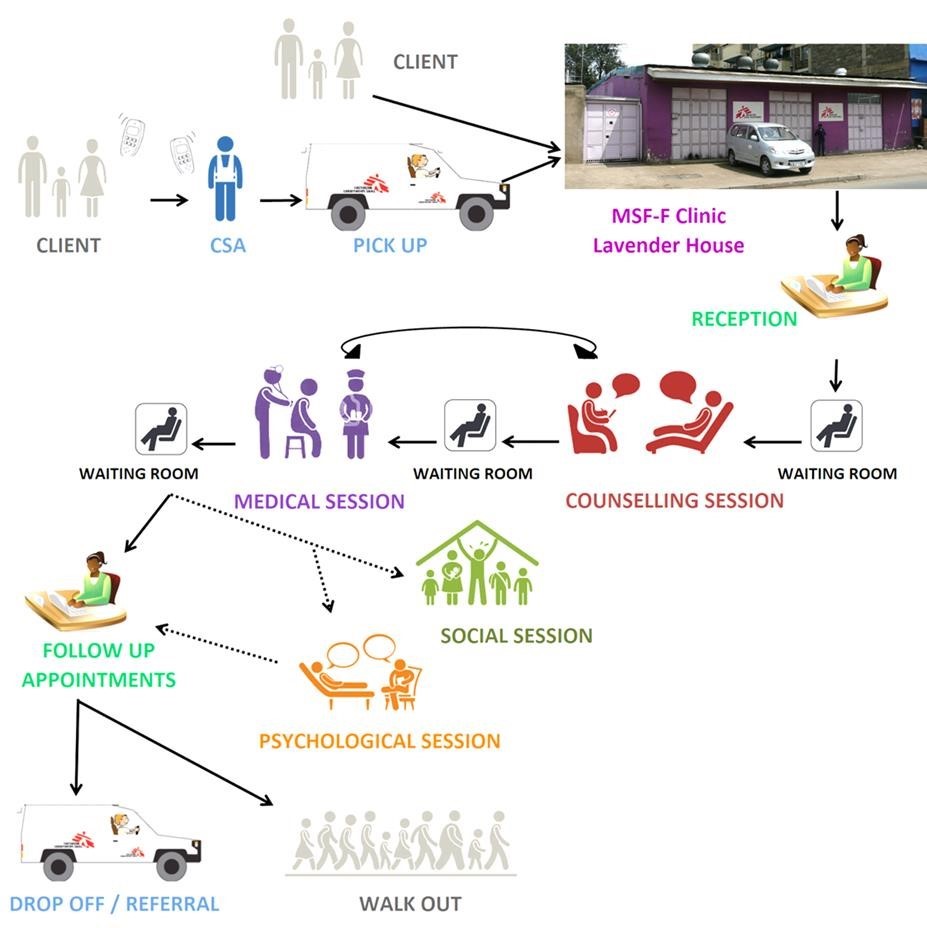
Purity narrates tearfully they suffered double tragedy at the hands of callous police officers: ”We reported the case to the police who had no mercy about our situation and they demanded us to fuel their car or give money for our case to be followed. Because we did not have any money with us, we knew we had lost justice just like that.” She sobs.
Despite MSF staff collecting vaginal swabs from the two sisters, lack of Police Cooperation technically kills a strong case.
As per the data from the last Kenyan Health and Demographic Indicator Survey, men were found even less likely to report than women (50% of women vs 72% of men) had never talked about the violence they went through. This is even worse when it comes to sexual violence as the shame and self-stigma may even be higher for them. Nearly two-thirds of survivors report that they knew their attacker (Data from the Gender Violence Recovery Centre) but more than half did not report the incident to the police or even disclose it to family members.
Last year MSF cared for more than 2,500 victims of sexual and gender-based violence in Kenya. This is the largest number of people affected by sexual violence in a non-conflict country that MSF has treated in any of their projects around the world. Around 50% of survivors at the MSF clinic are below 18 years old and more than 50% actually knew their attackers.
According to MSF data, in 2015, 600 High Vaginal Swabs were collected from victims and all of them had spermatozoa, only 11 were taken by police for analysis.
Jasian, a 17-year-old female refugee from the Democratic Republic of Congo’ (DRC’s) North Kivu, who earns a living from washing clothes for different households, was confronted by two men on her way from Nairobi’s Githurai area. The October 2015 attack took place around 8 pm.
“It was around eight in the evening when two men attacked me and wrapped a cloth around my face. I was not able to see them or scream on the roadside. They dragged me into a nearby bush and raped me the whole night. I only found myself on the road the following morning and slowly walked home where I straight went to bed without telling anyone. After two months I started getting sick and bleeding lot when I sort for help from an organization that works with refugees, they then referred me to MSF where I was treated. Until today I still have bleeding complications which give me nightmares.” She says through an interpreter.
Asked if she would like to see her perpetrators brought to book, she responds: “I don’t know what to say, it happened and due to fear and stigma related to rape I was not able to report this case on time.”
According to Nicholas Palarus, MSF Project Coordinator, Mathare and Eastleigh Programme, the Mathare clinic deals with many cases where all specimens for forensic analysis are collected from victims but not much of that is used during prosecution. Something he warns may hinder justice processes for the victims.
According to Nicolas, Mathare Clinic where SGBV victims are treated also has a trauma center which caters for victims from emergencies like accidents: “We have two centers in our Eastland’s program where Mathare and Makadara have clinics which serve areas like Mukuru kwa Reuben, Sinai, Kasarani, Githurai among others. We have a call center with staff who work 24 hours to receive calls from our networks on the ground which are either police, chiefs, schools, or community health social workers. After a phone call is made a quick analysis of the situation is done and if there is a need for the urgent evacuation of the victim we get a vehicle to bring the victim to our facility for treatment and care. ”
Nicolas reveals that females form the bulk of their patients. 93 percent of the more than 2500 patients treated were female.
Mercy Githara, a Clinical Psychologist at the Mathare MSF clinic says she sees 4-5 survivors of SGBV on a daily basis. ”I get to attend to first-time survivors and also those on follow – up sessions. I get to deal with very complex cases, especially from this informal settlement area. For example, recently I was brought eight children, boys from Sinai who were being sodomized by someone in their neighborhood. He used to lure boys with a smartphone to play games and in the end sodomize them.
This had been going on since February 2016 until recently when one child disclosed to the parents the painful happenings. It was one of the biggest groups that I had to attend. In fact, they were 15 initially and were first taken to Makadara clinic which got overstretched and decided to bring some to us.
This is just one among the many cases I have to deal with in my line of duty. We also get shelters for the victims who we feel need alternative accommodation. Refugees are also brought to us and it is usually had to trace their people they come with no identification documents.” Mercy confirms how she uses play therapy for children and cognitive behavior for adults.
The convention on the Elimination of All Forms of Discrimination against Women (CEDAW) came into existence in 1979 to assure that women enjoy equal rights in both public and private spheres. CEDAW convention. Article3: addresses human rights and fundamental freedoms for women. The convention encompasses cultural, social, economic, and political rights to bring forth full development and progression of women with a focus on the equality principle.
The women’s rights include education, employment, health care, voting among others. State parties that agreed to the convention committed to fighting violence directed towards women by making sure that legal and social protection measures are put in place.
According to William Hennequin, Head of Mission, Medecins Sans Frontiers (Doctors without Borders) MSF Kenya,”MSF has been working in Eastlands area of Nairobi since 2008 after the Post Election Violence. In total up to 2500 victims have been treated in 2015, most of these victims were mostly victims of sexual violence (rape, defilement, and sexual assault). This is currently our largest gender-based violence project worldwide. Two vehicles, fully equipped ambulances have been dedicated to the project, and currently, we are developing an emergency program that will target Mathare and Eastleigh areas .”
On the 16 Days of activism campaign, William notes with concern how the Launch of the National GBV Action Plan is critical in addressing cases of SGBV In Kenya. “We are welcoming this action plan that will help see scaling up of access to treatment and care of victims that are sexually abused. There are gaps especially in the health sector where not many health facilities are equipped to offer comprehensive care for SGBV victims and lack of coordination between law enforcement agencies, organizations, and judiciary.’’

